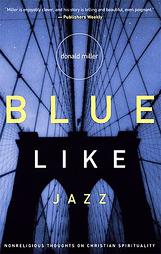Blue Like Jazz
 This book is a bestseller, and was recommended to me awhile back. Then more recently I read a few reviews that piqued my interest further. I wanted to know what the controversy was about.
This book is a bestseller, and was recommended to me awhile back. Then more recently I read a few reviews that piqued my interest further. I wanted to know what the controversy was about.
It was an effort to make myself finish it. The word that kept running through my mind was, “callow.” Once when I was interviewing a writer I respect, I asked him why he revised and reissued his earlier writings so much. He said it was because when he read them now, certain passages sounded “callow,” and he didn’t want them to speak for him anymore. I kept wondering as I was reading this, “Why is this a bestseller?” I think its success is in putting a finger on a pulse and affirming an experience with life and faith that resonates with many people.
It’s essentially a memoir, a series of short essays on different topics that loosely fall into place as a narrative of Donald Miller’s spiritual journey. It’s thematically arranged, not chronological. It struck me as an attempt to imitate Thoreau’s Walden from a city-dwelling twenty-something post-modern disenfranchised-evangelical perspective. He makes some accurate observations of the way the institutional church comes across. There are spots of truth, but the only one that really distinguishes itself is Miller’s account of a “reverse confessional” he and his believing friends set up on the Reed College campus. It provided a unique twist on the usual version of confession, and I liked that chapter a lot. Miller himself has a certain winsomeness and affability. Overall, though he mentions many friends in the book, I’m left with an impression of a person who’s radically alone. I appreciated his honesty and felt compassion for his life experience.
Despite these inviting qualities, the book brought me more trouble than pleasure. One of Miller’s criticisms of Christianity as it’s practiced in America is that it seems like a sales pitch. His solution is to make one of his own, suggested in his subtitle: “Nonreligious Thoughts on Christian Spirituality.” The book is an attempt to disassociate himself from American Christianity, starting with semantics: he substitutes “Christian Spirituality” for “Christianity” and “I felt” for “I thought.” He proceeds through his criticism of what Dallas Willard (I think) calls “boundary markers” associated with Bible-believing Christians: lifestyle choices, political persuasions, styles of bigotry. He concludes with an invitation to believe his version. If that’s not as comparable to Amway strategy as he complains that churches are, I don’t know what is.
The only layer I’m going to engage here is the book’s anti-intellectualism. Miller’s lens at this level is badly in need of adjustment, in my opinion. A few months ago I read both Os Guinness and Nancy Pearcey making the case for restoring the rational legitimacy of faith. Here’s a book that fully cooperates with the relegation of the Christian faith to the realm of private emotion, and participates in stripping it of authority to make rational truth claims. For example:
- “I couldn’t give myself to Christianity because it was a religion for the intellectually naive.”
- “The Garden of Eden, the fall of man, was a pretty silly story…”
- “For thousands of years big-haired preachers have talked about the idea that we need to make a decision, to follow or reject Christ…”
- “It all sounded so very witless to me.”
“Silly?” “Witless?” At the secondary level, think for one minute about some of the great minds that have contended for the Christian faith through the ages. At the primary level, think of the greatest Old Testament scholar and expositor of all time: Jesus Christ. Time and again in the gospels we’re told that Jesus speaks not with “authenticity,” but with “authority.” Certainly authenticity is part of this, but so is intellectual mastery. Nourishing the mind (“heart”) so that we can employ “right thinking” is extremely important all through Scripture. How could Donald Miller expect anyone to take him seriously? Yet apparently lots of people do. His style of thought must be peculiarly fitted to this age.
Miller’s is an epistemology of feeling. “It felt more than true, it felt meaningful,” he says at one point. Then, later, “I think Christian spirituality is like jazz music,” he writes. “I think loving Jesus is something you feel. I think it is something very difficult to get on paper… Everybody sings their own song the way they feel it, everybody closes their eyes and lifts up their hands.” Sure. I agree that feeling is one dimension of loving Jesus. But it’s tissue-thin if that’s all you have.
Several times he argues for a God who is not only larger than we can comprehend, but utterly incomprehensible and nonrational. ”I can no more understand the totality of God than the pancake I made for breakfast understands the complexity of me,” he writes. Well, again, sure — partly. We can’t comprehend “the totality” of God. But what about all that God has attempted to reveal about himself through his word? What about Jesus, whose incarnation trumps all the limitations of spoken language, who represents God’s yearning to be known — so much that he takes on the flesh of one of his created beings in an effort to make eternal things comprehensible?
At times I think Miller is simply overstating in an attempt at wit. (I couldn’t help but think of Screwtape’s comment: “Flippancy builds up around a man the finest armour plating against the Enemy that I know, and it is quite free from the dangers inherent in the other sources of laughter.”) But on the whole the book’s message is clear: rational thought mixed with spirituality is a toxic brew and must be avoided at all costs. The result is an epistemology of deflection — the narrative ricochets from almost-thought to almost-thought, never achieving a satisfying grip on anything. (At least, not a conscious one. Such real ”epiphanies” as are contained here come, unavoidably, from thought.)
The cover presents this as a book for “anyone wondering if the Christian faith is still relevant in a postmodern culture.” Wikipedia links it to the emergent movement, a term I’d seen but have only recently read a bit more about. When I first started blogging, I tried to get some of my own thoughts down about what happens to Christianity when it’s wrestled into a “culturally relevant” mold. This book certainly doesn’t convince me otherwise. Interestingly, I’ve been reading in Ecclesiastes at the same time as my reading of this book. Maybe this is why it seems to be “nothing new under the sun,” but rather another reactionary packaging of the Christian faith in a limiting, in some ways estranging mode. Again, I think of Screwtape’s words (as I often do when my own thoughts become overly critical):
One of our great allies at present is the Church itself. Do not misunderstand me. I do not mean the Church as we see her spread out through all time and space and rooted in eternity, terrible as an army with banners. That, I confess, is a spectacle which makes our boldest tempters uneasy. But fortunately it is quite invisible to these humans… Make his mind flit to and fro between the expression “the body of Christ” and the actual faces in the next pew… Provided that any of these neighbors sing out of tune, or have boots that squeak, or double chins, or odd clothes, the patient will quite easily believe that their religion must therefore be somehow ridiculous… Keep everything hazy in his mind now.
I certainly agree with some of the priorities of the emergent church as I understand them, and as Blue Like Jazz gives voice to them: loving others rather than taking a combative or bigoted attitude, focusing on the heart rather than the outward, cultivating community, in short majoring on the majors and not the minors. That’s just biblical Christianity. But the salesmanship and anti-rational trappings of this book strike me as nothing new, and certainly no solution to the problems of how to live out biblical faith in a postmodern age. If there’s to be change in our institutions, it can’t be by changing the message God has taken such pains to codify and to locate in human history.


